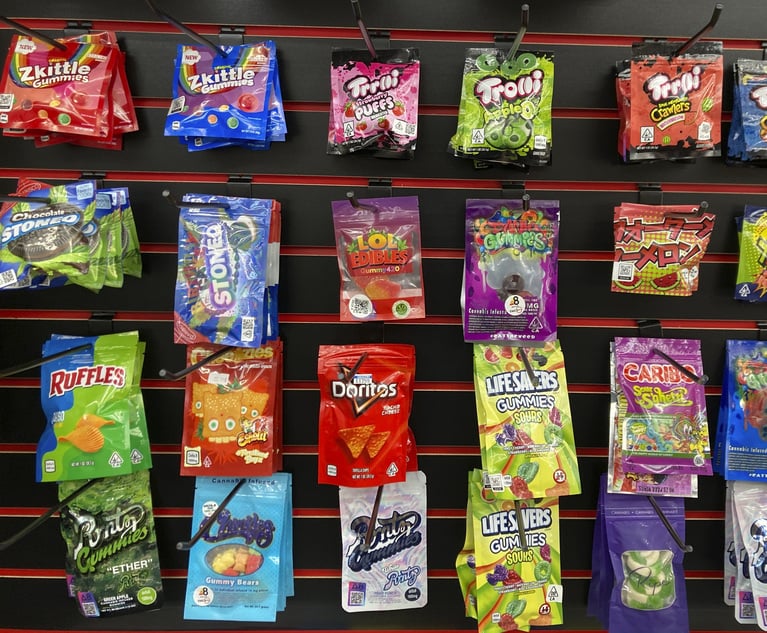Higher Law: Your Ad Not Here | Are Tax Breaks the Answer? | Advice for Banking Regulators
Some observations from the field on marijuana advertising. Is a state tax cut the right answer for cannabis startups? Plus: Who got the work, and more. Thanks for reading!
January 31, 2019 at 04:00 PM
7 minute read
Welcome back to Higher Law, our weekly briefing on all things cannabis. I'm Cheryl Miller, reporting for Law.com from Sacramento, where the temperature tumbled to 47 degrees last night. I offer my sincere condolences to Higher Lawyers in the Midwest and Northeast who have to endure the current brutal conditions. I've yet to find a Polar Vortex cannabis strain, but Im sure it's coming.
This week we look at cannabis advertising. Forget trying to run a benign medical marijuana spot during the Super Bowl. A lot of state-legal operators would just like to keep their Instagram accounts up and running. Plus, is lowering cannabis taxes in California the solution to staving off the black market? And a pro-marijuana lawmaker predicts movement on efforts to increase marijuana banking access.
Thanks as always for reading. I appreciate your feedback, story ideas and tips for staying warm in -41 degree windchill. Drop me a line at [email protected] or you can call me at 916-448-2935. Follow me on Twitter at @capitalaccounts.
Your Ad Not Here
Bloomberg had a nice story and maybe even a nicer headline this week about the challenges state-licensed marijuana companies face in pitching their products: “Advertising Weed is Tough When the Feds Consider You a Drug Dealer.”
The piece talks about the potential of an $80 million legal weed market in the U.S. by 2030 being hampered by marijuana operators being unable to advertise in the same way widget-makers or even booze-peddlers can.
Last week we mentioned that CBS rejected Acreage Holdings' request to buy Super Bowl ad time to run a one-minute spot touting the benefits of medical marijuana. The problem extends to social media, where policies that bar drug advertising are not evenly enforced.
“What will happen is a company will be running a popular account for three years and Instagram will suddenly shut them down with no explanation,” said Amanda Conley, a partner at Branch & Branch.
That looming threat of an account disappearing puts lawyers in a bind when clients complain that a competitor is using their logo or other IP online.
“We don't want to bring our clients' accounts to Instagram's attention and have them shut down,” Conley said.
I found a handful of Sacramento-area dispensaries on Facebook promoting pre-rolls and exotic-sounding strains Thursday morning. But outlets stretching from Massachusetts to Alaska have had their sites closed.
Beyond social media, individual states have their own rules about how, where and when marijuana companies can advertise. In California, for instance, marijuana ads can be placed on TV, in print and digital media, and on radio, but only if 71.6 percent of the audience is “reasonably expected” to be at least 21 years old.
So how do attorneys advise clients trying to build brand identities in this advertising minefield? On a case by case basis, said Conley and fellow Brand & Branch partner Shabnam Malek.
“It is really a problem to not have advertising rules applied evenly to an industry that does legal marketing in a bunch of states,” Malek said.
Are Marijuana Tax Breaks the Answer?
California lawmakers this week introduced legislation to temporarily roll back excise taxes from 15 percent to 11 percent and to suspend the cultivation tax entirely through 2022. The idea, the bipartisan legislative sponsors said, is to better help licensed operators complete against a still-thriving black market.
“We are helping legal cannabis businesses with their transition into the marketplace, just like we would for any startup industry,” said California treasurer Fiona Ma.
But is a state tax cut the right answer for cannabis startups?
“The real reason that the black market is able to compete and win against regulated cannabis businesses is 280E,” said Greenspoon Marder partner Rachel Gillette ”It truly acts as a subsidy to the black market.”
Gillette called the bill a “step in the right direction” but said illicit operators will always have an advantage until federal tax collectors stop treating licensed businesses as drug traffickers.
Jonathan Storper, a partner at Hanson Bridgett, said the bill is a “good start” but added that a state crackdown on the black market could prove more effective. He also questioned whether local cities and counties might raise their own fees on growers and dispensaries if the state cuts its own tax levy.
Who Got the Work
• Add Montgomery McCracken to the growing list of firms launching cannabis practices. Cherry Hill, N.J.-based partners Georgette Castner and Michael Feketewill lead an interdisciplinary team that also includes partners William Kennedy, Lathrop Nelson and John Papianou and associate Ethan Hougah.
• Greenspoon Marder has added eight new attorneys to its ranks. Those working in the cannabis law group are partner Jessica Wasserman in Washington, D.C., and senior counsel Kristin Jordan in New York.
In the Weeds…
>> “Bank regulators who examine institutions for compliance should clarify the process for both serving marijuana firms and for dealing with existing customers who do business with those firms,” Aaron Klein, a Brookings Institution economic studies fellow, writes. [Los Angeles Times]
>> Congressman Earl Blumenauer says he'll start a year-long push for cannabis legalization with a focus on banking reforms. The Oregon Democrat told a Washington, D.C. gathering that he expects a friendly reception from Congresswoman Maxine Waters, D-Calif, because of her state's burgeoning cannabis market. Blumenauer said advocates and their legislative plans “did just get knocked back on our heels” by the government shutdown. [The Hill]
>> Adult-use marijuana could be legal in Minnesota by 2022 under legislation unveiled this week. “The issue of cannabis legalization is one that's moving incredibly fast around the country,” Rep. Mike Freiberg said at a news conference. “At a certain point it will become inevitable in Minnesota.” The proposal faces opposition from some lawmakers, including those who say changes to the state's medical marijuana regulations should be a higher priority. [Star Tribune]
>> Pennsylvania Gov. Tom Wolf wants to have a conversation about legalization. Wolf announced that Lt. Gov. John Fetterman will hold town-hall-style sessions in each of Pennsylvania's 67 counties to hear state residents' thoughts on legalizing adult-use. State lawmakers approved medical marijuana in 2016 and the first sales started last year. [AP]
>> It's all about the hemp. Whitt Steineker and Jay Wright, law partners at Bradley Arant Boult Cummings, write that the 2018 Farm Bill's effective descheduling of hemp under the Controlled Substances Act will attract a whole new crop of investors. Expect a lot of consolidation and integration in the developing hemp market, they write. “Accordingly, attorneys and investors should anticipate significant merger and acquisition activity in the coming years.” [The National Law Journal]
All the Things: Calendar Watch
Feb. 5-7 – The Arcview Investor Forum takes place in Los Angeles. Scheduled speakers include CohnReznick principal Margaret Shanley and Greenberg Traurigpartner Andrew Zausner.
Feb. 6 - Aird & Berlis hosts the webinar, “Going Public in Canada.” Speakers include members of the firm and a representative of the Canadian Securities Exchange.
Feb. 7 - The last day to submit comments on the National Association of Cannabis Business' proposed standards on lab testing and product integrity.
Feb. 8 - Cannabis Europa Paris 2019 takes place.
This content has been archived. It is available through our partners, LexisNexis® and Bloomberg Law.
To view this content, please continue to their sites.
Not a Lexis Subscriber?
Subscribe Now
Not a Bloomberg Law Subscriber?
Subscribe Now
NOT FOR REPRINT
© 2025 ALM Global, LLC, All Rights Reserved. Request academic re-use from www.copyright.com. All other uses, submit a request to [email protected]. For more information visit Asset & Logo Licensing.
You Might Like
View All
NY Cannabis Marketing Rulings / Rescheduling Effects / Honigman's Work on Trademark Suit / Goodbye
9 minute read
Workplace Weed and Labor Pacts / State AGs and Hemp / Maryland Licensing Suit / Vicente Sues Recruiter
9 minute readTrending Stories
- 1DOJ Files Antitrust Suit to Block Amex GBT's Acquisition of Competitor
- 2K&L Gates Sheds Space, but Will Stay in Flagship Pittsburgh Office After Lease Renewal
- 3US Soccer Monopoly Trial Set to Kick Off in Brooklyn Federal Court
- 4NY AG James Targets Crypto Fraud Which Allegedly Ensnared Victims With Fake Jobs
- 5The 'Motherhood Advantage' in Law: Time to Flip the Script
Who Got The Work
Michael G. Bongiorno, Andrew Scott Dulberg and Elizabeth E. Driscoll from Wilmer Cutler Pickering Hale and Dorr have stepped in to represent Symbotic Inc., an A.I.-enabled technology platform that focuses on increasing supply chain efficiency, and other defendants in a pending shareholder derivative lawsuit. The case, filed Oct. 2 in Massachusetts District Court by the Brown Law Firm on behalf of Stephen Austen, accuses certain officers and directors of misleading investors in regard to Symbotic's potential for margin growth by failing to disclose that the company was not equipped to timely deploy its systems or manage expenses through project delays. The case, assigned to U.S. District Judge Nathaniel M. Gorton, is 1:24-cv-12522, Austen v. Cohen et al.
Who Got The Work
Edmund Polubinski and Marie Killmond of Davis Polk & Wardwell have entered appearances for data platform software development company MongoDB and other defendants in a pending shareholder derivative lawsuit. The action, filed Oct. 7 in New York Southern District Court by the Brown Law Firm, accuses the company's directors and/or officers of falsely expressing confidence in the company’s restructuring of its sales incentive plan and downplaying the severity of decreases in its upfront commitments. The case is 1:24-cv-07594, Roy v. Ittycheria et al.
Who Got The Work
Amy O. Bruchs and Kurt F. Ellison of Michael Best & Friedrich have entered appearances for Epic Systems Corp. in a pending employment discrimination lawsuit. The suit was filed Sept. 7 in Wisconsin Western District Court by Levine Eisberner LLC and Siri & Glimstad on behalf of a project manager who claims that he was wrongfully terminated after applying for a religious exemption to the defendant's COVID-19 vaccine mandate. The case, assigned to U.S. Magistrate Judge Anita Marie Boor, is 3:24-cv-00630, Secker, Nathan v. Epic Systems Corporation.
Who Got The Work
David X. Sullivan, Thomas J. Finn and Gregory A. Hall from McCarter & English have entered appearances for Sunrun Installation Services in a pending civil rights lawsuit. The complaint was filed Sept. 4 in Connecticut District Court by attorney Robert M. Berke on behalf of former employee George Edward Steins, who was arrested and charged with employing an unregistered home improvement salesperson. The complaint alleges that had Sunrun informed the Connecticut Department of Consumer Protection that the plaintiff's employment had ended in 2017 and that he no longer held Sunrun's home improvement contractor license, he would not have been hit with charges, which were dismissed in May 2024. The case, assigned to U.S. District Judge Jeffrey A. Meyer, is 3:24-cv-01423, Steins v. Sunrun, Inc. et al.
Who Got The Work
Greenberg Traurig shareholder Joshua L. Raskin has entered an appearance for boohoo.com UK Ltd. in a pending patent infringement lawsuit. The suit, filed Sept. 3 in Texas Eastern District Court by Rozier Hardt McDonough on behalf of Alto Dynamics, asserts five patents related to an online shopping platform. The case, assigned to U.S. District Judge Rodney Gilstrap, is 2:24-cv-00719, Alto Dynamics, LLC v. boohoo.com UK Limited.
Featured Firms
Law Offices of Gary Martin Hays & Associates, P.C.
(470) 294-1674
Law Offices of Mark E. Salomone
(857) 444-6468
Smith & Hassler
(713) 739-1250













